BBC Organisational Behaviour: Analysis of Culture, Power & Motivation
VerifiedAdded on 2024/07/12
|29
|5411
|375
Report
AI Summary
This report provides an in-depth analysis of organisational behaviour within the British Broadcasting Corporation (BBC), examining the influence of culture, politics, and power on employee behaviour and team dynamics. It explores various cultural classifications using Charles Handy's model, power dynamics through French and Raven's theory, and political behaviours based on Chanlat's characteristics. The report critically evaluates the impact of these factors on individual and team performance within BBC. Furthermore, it delves into content and process theories of motivation, such as Alderfer's ERG theory, Maslow's hierarchy of needs, Vroom's expectancy theory, and Latham and Locke's goal-setting theory, to assess their influence on improving team effectiveness. The report also emphasizes the importance of emotional intelligence and soft skills for managers and teams within the BBC, highlighting Goleman's EI theory and its practical applications.
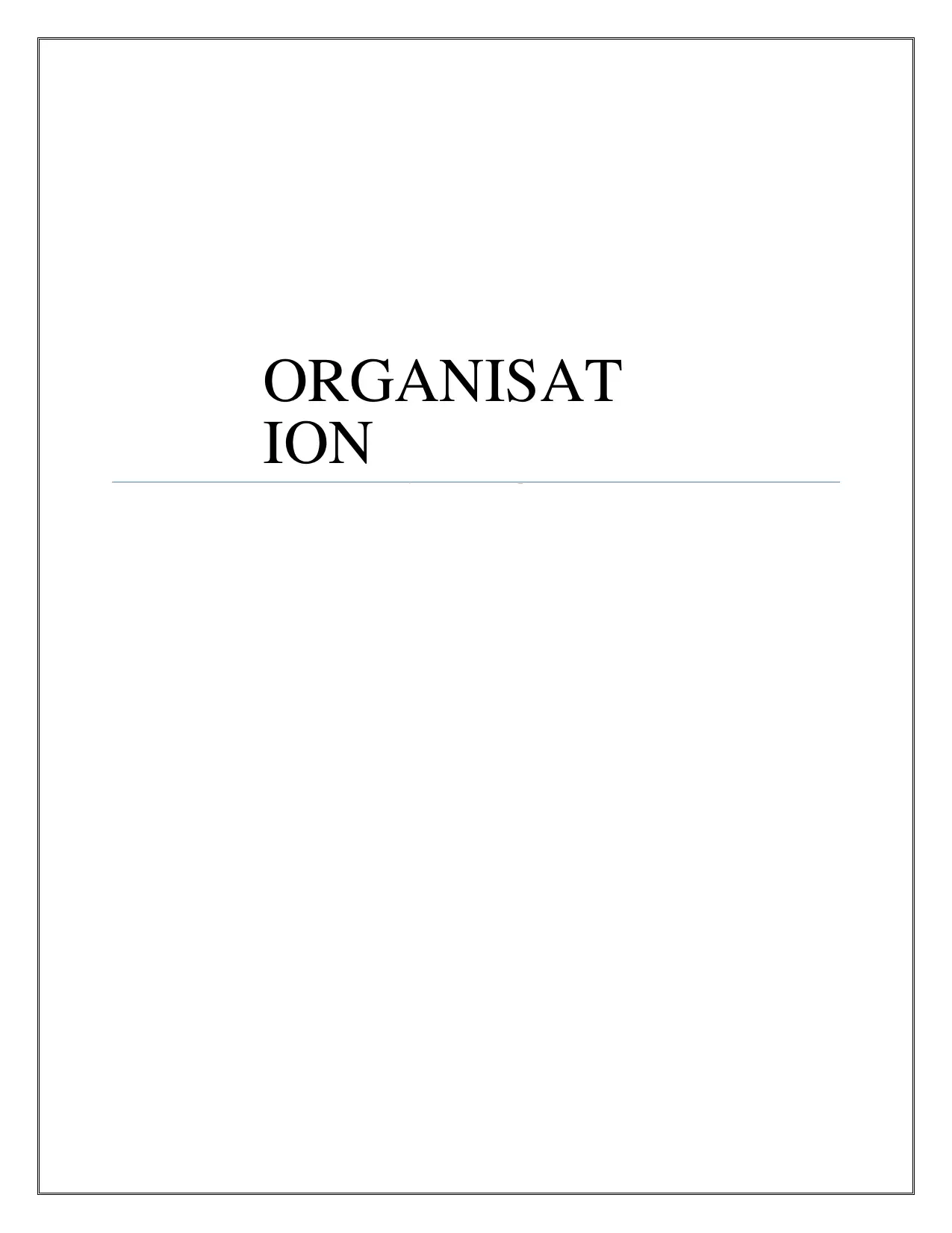
Paraphrase This Document
Need a fresh take? Get an instant paraphrase of this document with our AI Paraphraser
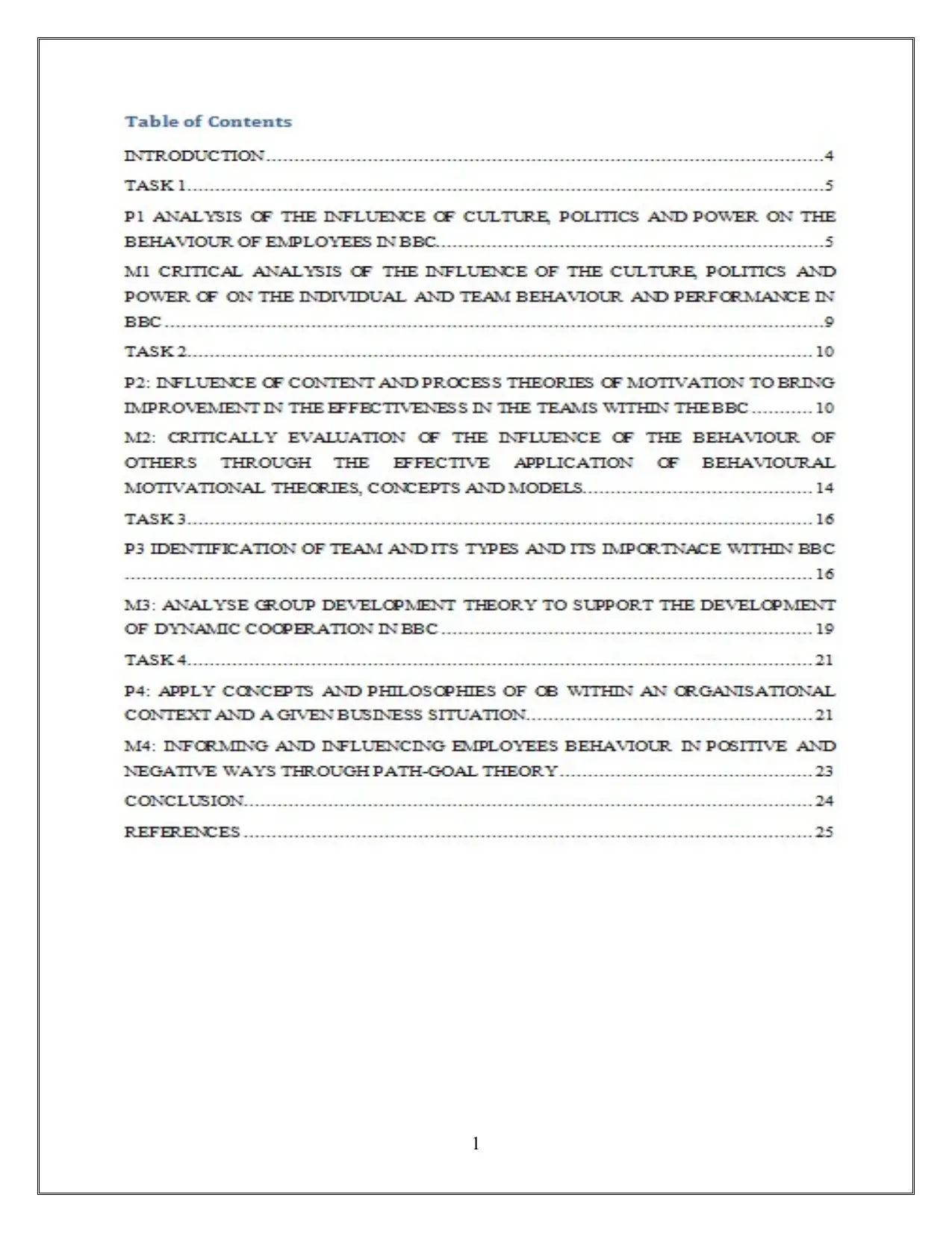
1
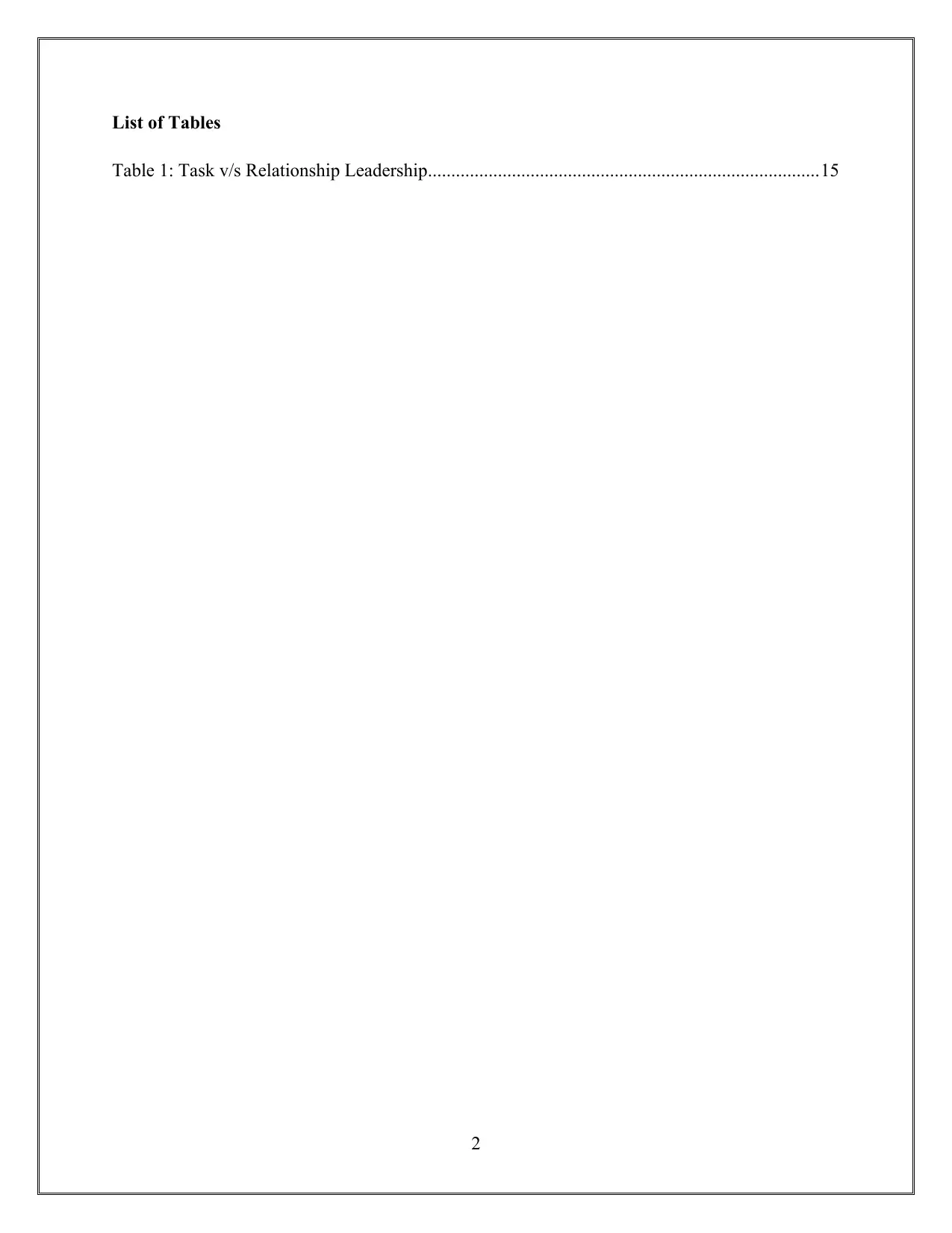
List of Tables
Table 1: Task v/s Relationship Leadership....................................................................................15
2
Table 1: Task v/s Relationship Leadership....................................................................................15
2
⊘ This is a preview!⊘
Do you want full access?
Subscribe today to unlock all pages.

Trusted by 1+ million students worldwide
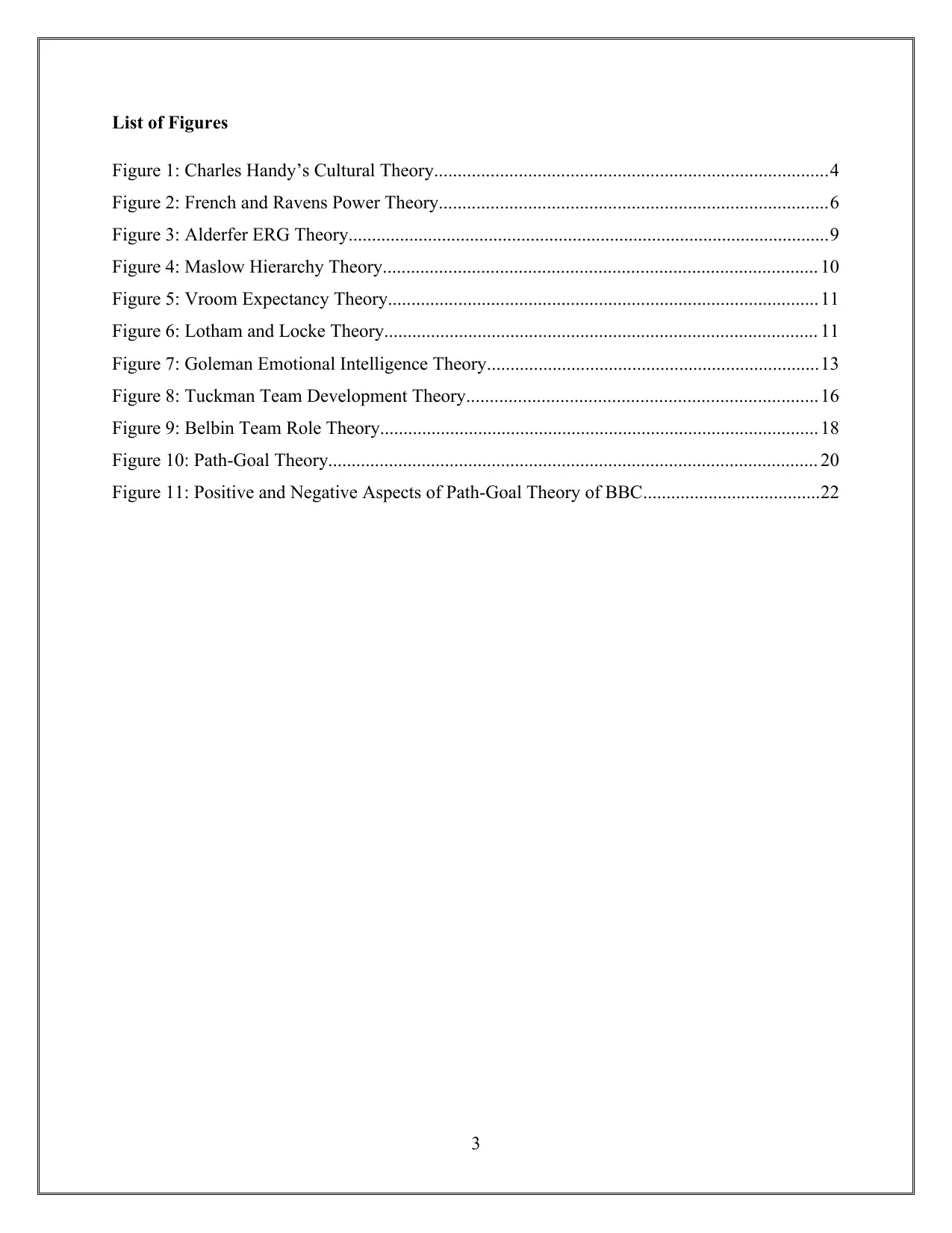
List of Figures
Figure 1: Charles Handy’s Cultural Theory....................................................................................4
Figure 2: French and Ravens Power Theory...................................................................................6
Figure 3: Alderfer ERG Theory.......................................................................................................9
Figure 4: Maslow Hierarchy Theory............................................................................................. 10
Figure 5: Vroom Expectancy Theory............................................................................................11
Figure 6: Lotham and Locke Theory............................................................................................. 11
Figure 7: Goleman Emotional Intelligence Theory.......................................................................13
Figure 8: Tuckman Team Development Theory...........................................................................16
Figure 9: Belbin Team Role Theory.............................................................................................. 18
Figure 10: Path-Goal Theory......................................................................................................... 20
Figure 11: Positive and Negative Aspects of Path-Goal Theory of BBC......................................22
3
Figure 1: Charles Handy’s Cultural Theory....................................................................................4
Figure 2: French and Ravens Power Theory...................................................................................6
Figure 3: Alderfer ERG Theory.......................................................................................................9
Figure 4: Maslow Hierarchy Theory............................................................................................. 10
Figure 5: Vroom Expectancy Theory............................................................................................11
Figure 6: Lotham and Locke Theory............................................................................................. 11
Figure 7: Goleman Emotional Intelligence Theory.......................................................................13
Figure 8: Tuckman Team Development Theory...........................................................................16
Figure 9: Belbin Team Role Theory.............................................................................................. 18
Figure 10: Path-Goal Theory......................................................................................................... 20
Figure 11: Positive and Negative Aspects of Path-Goal Theory of BBC......................................22
3
Paraphrase This Document
Need a fresh take? Get an instant paraphrase of this document with our AI Paraphraser
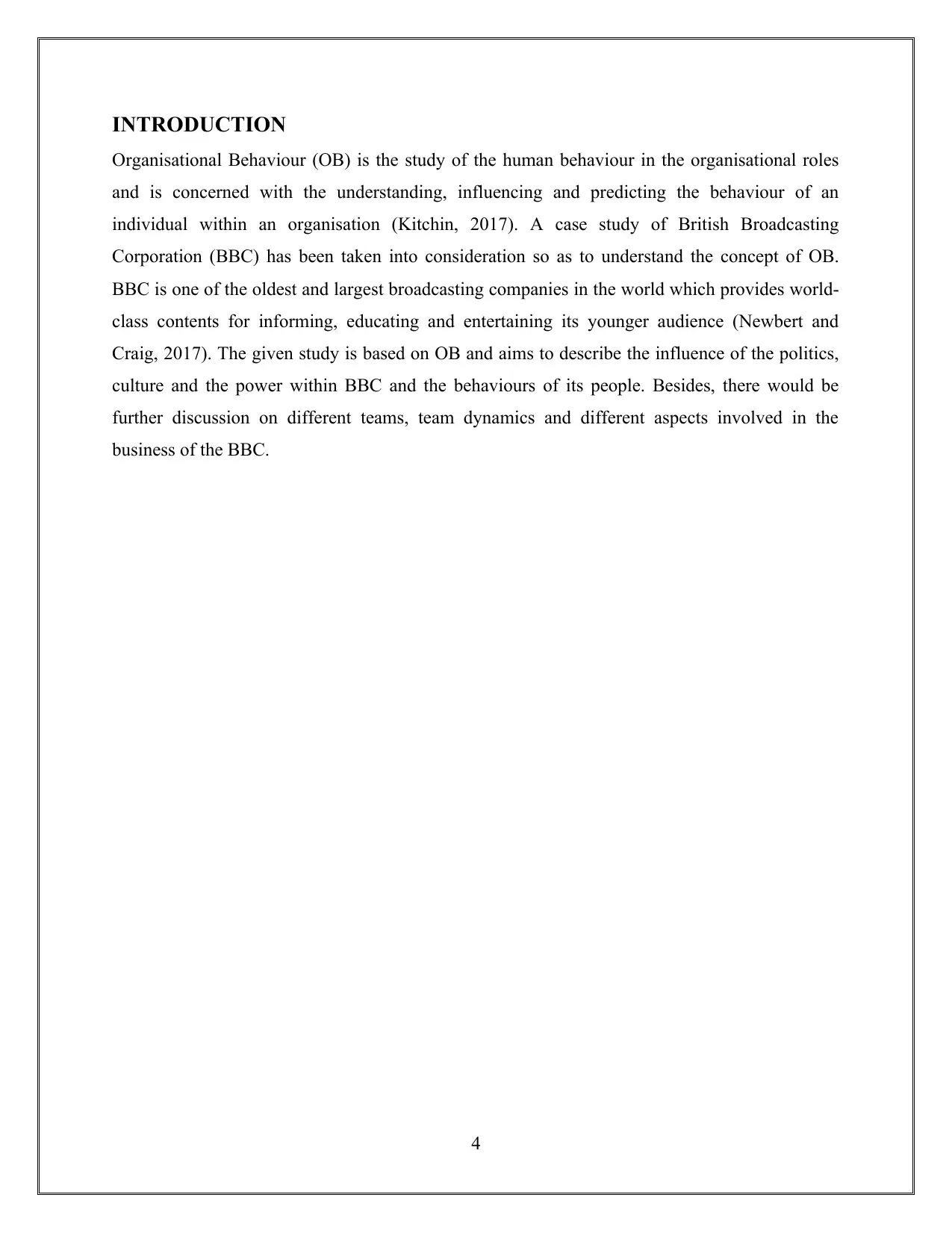
INTRODUCTION
Organisational Behaviour (OB) is the study of the human behaviour in the organisational roles
and is concerned with the understanding, influencing and predicting the behaviour of an
individual within an organisation (Kitchin, 2017). A case study of British Broadcasting
Corporation (BBC) has been taken into consideration so as to understand the concept of OB.
BBC is one of the oldest and largest broadcasting companies in the world which provides world-
class contents for informing, educating and entertaining its younger audience (Newbert and
Craig, 2017). The given study is based on OB and aims to describe the influence of the politics,
culture and the power within BBC and the behaviours of its people. Besides, there would be
further discussion on different teams, team dynamics and different aspects involved in the
business of the BBC.
4
Organisational Behaviour (OB) is the study of the human behaviour in the organisational roles
and is concerned with the understanding, influencing and predicting the behaviour of an
individual within an organisation (Kitchin, 2017). A case study of British Broadcasting
Corporation (BBC) has been taken into consideration so as to understand the concept of OB.
BBC is one of the oldest and largest broadcasting companies in the world which provides world-
class contents for informing, educating and entertaining its younger audience (Newbert and
Craig, 2017). The given study is based on OB and aims to describe the influence of the politics,
culture and the power within BBC and the behaviours of its people. Besides, there would be
further discussion on different teams, team dynamics and different aspects involved in the
business of the BBC.
4
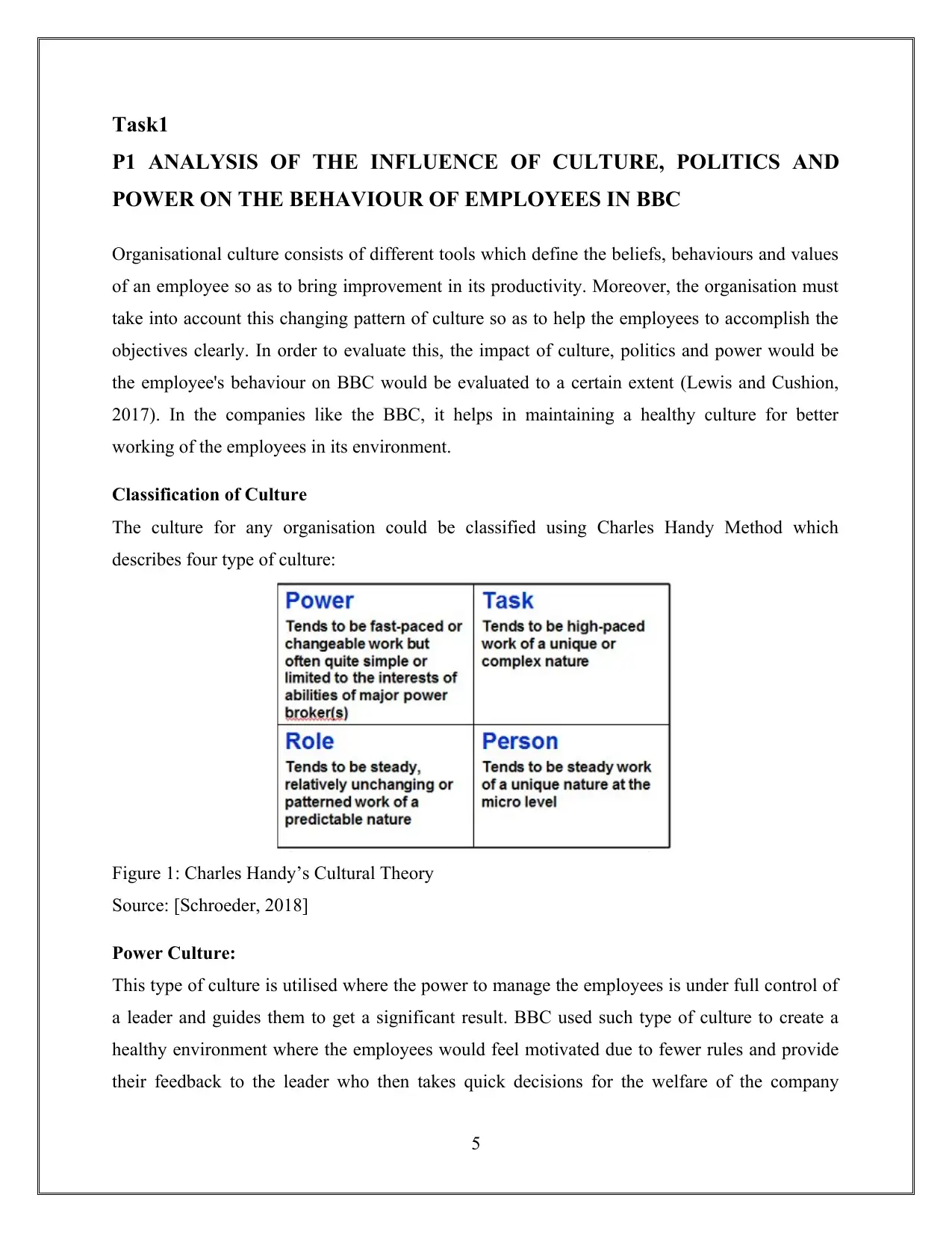
Task1
P1 ANALYSIS OF THE INFLUENCE OF CULTURE, POLITICS AND
POWER ON THE BEHAVIOUR OF EMPLOYEES IN BBC
Organisational culture consists of different tools which define the beliefs, behaviours and values
of an employee so as to bring improvement in its productivity. Moreover, the organisation must
take into account this changing pattern of culture so as to help the employees to accomplish the
objectives clearly. In order to evaluate this, the impact of culture, politics and power would be
the employee's behaviour on BBC would be evaluated to a certain extent (Lewis and Cushion,
2017). In the companies like the BBC, it helps in maintaining a healthy culture for better
working of the employees in its environment.
Classification of Culture
The culture for any organisation could be classified using Charles Handy Method which
describes four type of culture:
Figure 1: Charles Handy’s Cultural Theory
Source: [Schroeder, 2018]
Power Culture:
This type of culture is utilised where the power to manage the employees is under full control of
a leader and guides them to get a significant result. BBC used such type of culture to create a
healthy environment where the employees would feel motivated due to fewer rules and provide
their feedback to the leader who then takes quick decisions for the welfare of the company
5
P1 ANALYSIS OF THE INFLUENCE OF CULTURE, POLITICS AND
POWER ON THE BEHAVIOUR OF EMPLOYEES IN BBC
Organisational culture consists of different tools which define the beliefs, behaviours and values
of an employee so as to bring improvement in its productivity. Moreover, the organisation must
take into account this changing pattern of culture so as to help the employees to accomplish the
objectives clearly. In order to evaluate this, the impact of culture, politics and power would be
the employee's behaviour on BBC would be evaluated to a certain extent (Lewis and Cushion,
2017). In the companies like the BBC, it helps in maintaining a healthy culture for better
working of the employees in its environment.
Classification of Culture
The culture for any organisation could be classified using Charles Handy Method which
describes four type of culture:
Figure 1: Charles Handy’s Cultural Theory
Source: [Schroeder, 2018]
Power Culture:
This type of culture is utilised where the power to manage the employees is under full control of
a leader and guides them to get a significant result. BBC used such type of culture to create a
healthy environment where the employees would feel motivated due to fewer rules and provide
their feedback to the leader who then takes quick decisions for the welfare of the company
5
⊘ This is a preview!⊘
Do you want full access?
Subscribe today to unlock all pages.

Trusted by 1+ million students worldwide
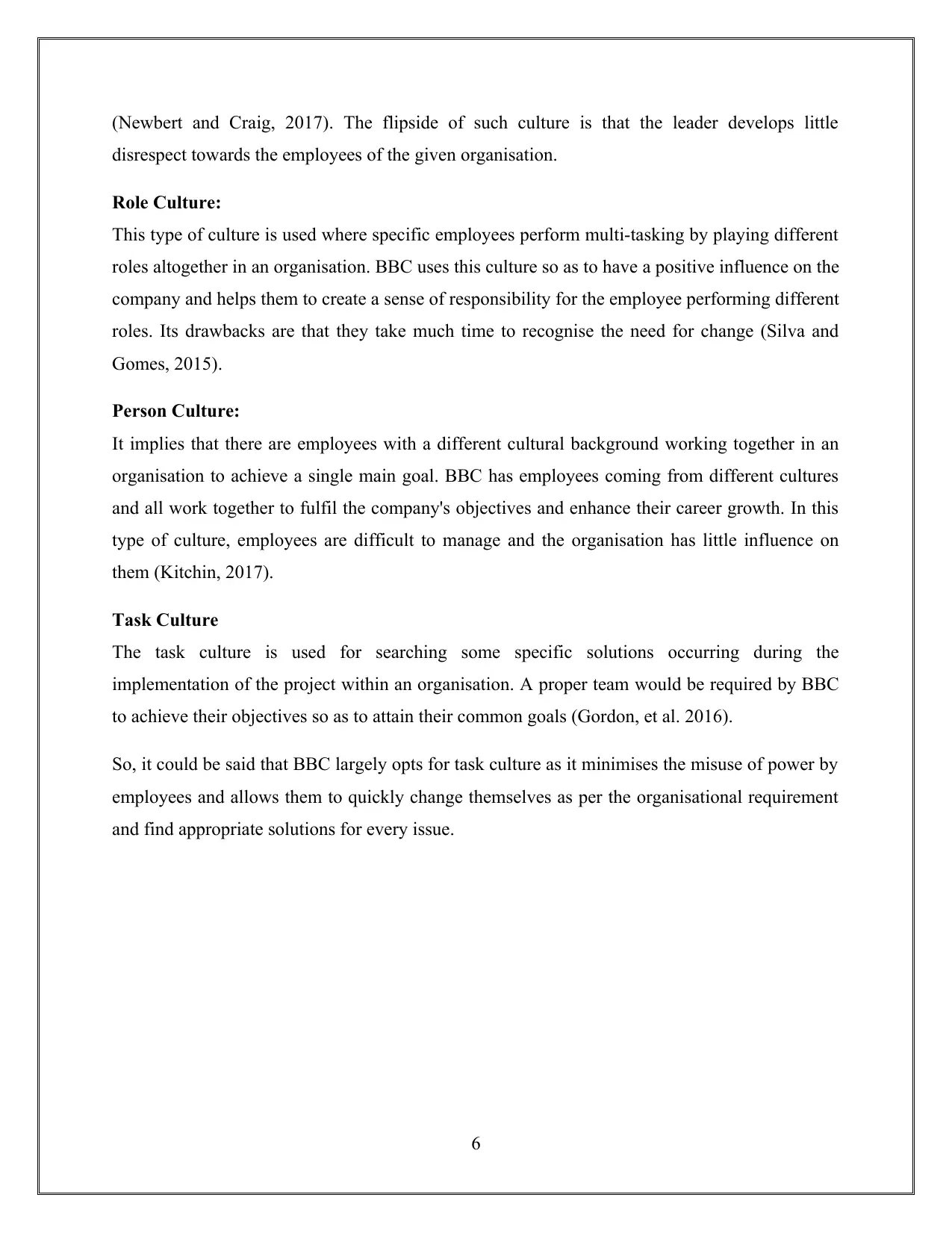
(Newbert and Craig, 2017). The flipside of such culture is that the leader develops little
disrespect towards the employees of the given organisation.
Role Culture:
This type of culture is used where specific employees perform multi-tasking by playing different
roles altogether in an organisation. BBC uses this culture so as to have a positive influence on the
company and helps them to create a sense of responsibility for the employee performing different
roles. Its drawbacks are that they take much time to recognise the need for change (Silva and
Gomes, 2015).
Person Culture:
It implies that there are employees with a different cultural background working together in an
organisation to achieve a single main goal. BBC has employees coming from different cultures
and all work together to fulfil the company's objectives and enhance their career growth. In this
type of culture, employees are difficult to manage and the organisation has little influence on
them (Kitchin, 2017).
Task Culture
The task culture is used for searching some specific solutions occurring during the
implementation of the project within an organisation. A proper team would be required by BBC
to achieve their objectives so as to attain their common goals (Gordon, et al. 2016).
So, it could be said that BBC largely opts for task culture as it minimises the misuse of power by
employees and allows them to quickly change themselves as per the organisational requirement
and find appropriate solutions for every issue.
6
disrespect towards the employees of the given organisation.
Role Culture:
This type of culture is used where specific employees perform multi-tasking by playing different
roles altogether in an organisation. BBC uses this culture so as to have a positive influence on the
company and helps them to create a sense of responsibility for the employee performing different
roles. Its drawbacks are that they take much time to recognise the need for change (Silva and
Gomes, 2015).
Person Culture:
It implies that there are employees with a different cultural background working together in an
organisation to achieve a single main goal. BBC has employees coming from different cultures
and all work together to fulfil the company's objectives and enhance their career growth. In this
type of culture, employees are difficult to manage and the organisation has little influence on
them (Kitchin, 2017).
Task Culture
The task culture is used for searching some specific solutions occurring during the
implementation of the project within an organisation. A proper team would be required by BBC
to achieve their objectives so as to attain their common goals (Gordon, et al. 2016).
So, it could be said that BBC largely opts for task culture as it minimises the misuse of power by
employees and allows them to quickly change themselves as per the organisational requirement
and find appropriate solutions for every issue.
6
Paraphrase This Document
Need a fresh take? Get an instant paraphrase of this document with our AI Paraphraser
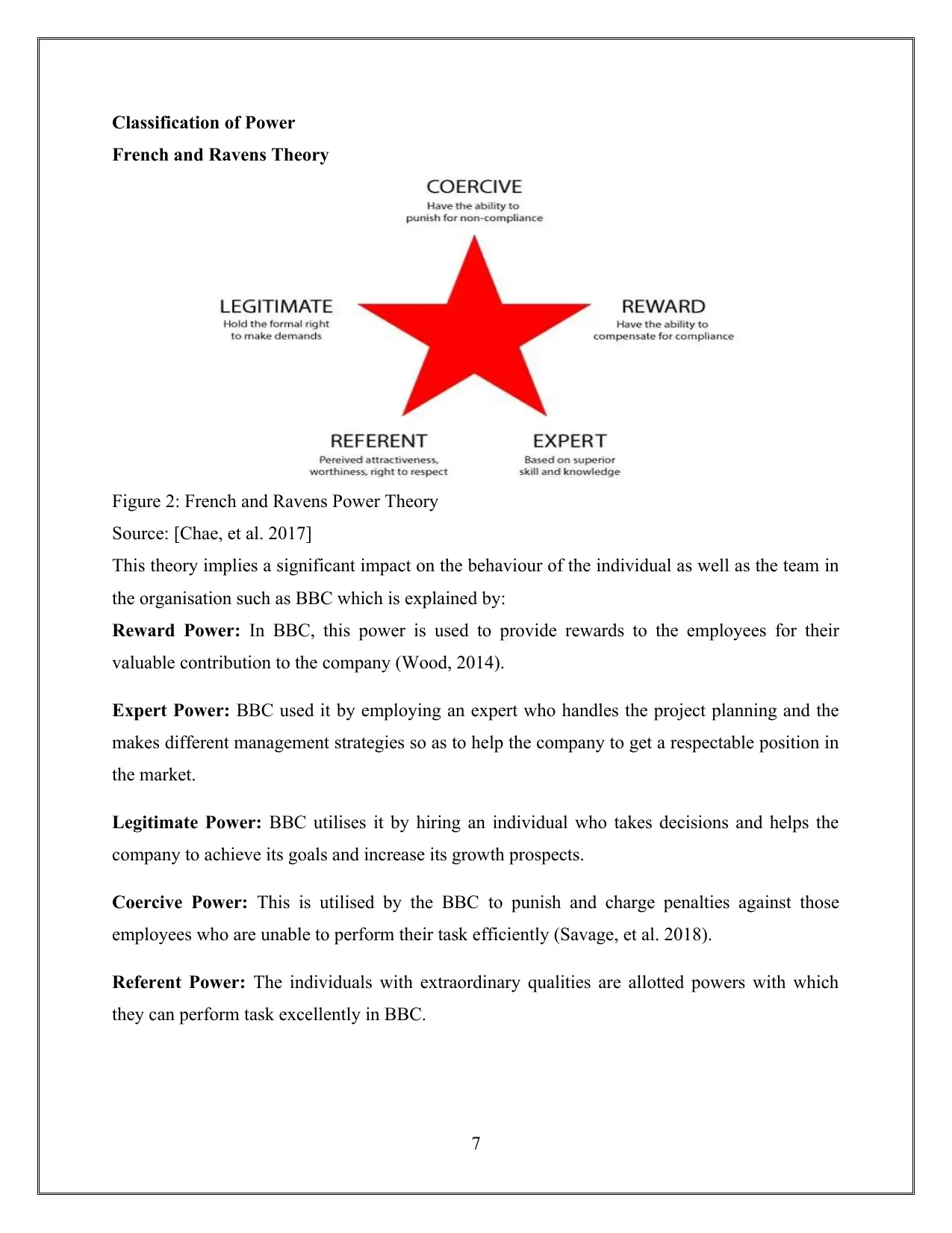
Classification of Power
French and Ravens Theory
Figure 2: French and Ravens Power Theory
Source: [Chae, et al. 2017]
This theory implies a significant impact on the behaviour of the individual as well as the team in
the organisation such as BBC which is explained by:
Reward Power: In BBC, this power is used to provide rewards to the employees for their
valuable contribution to the company (Wood, 2014).
Expert Power: BBC used it by employing an expert who handles the project planning and the
makes different management strategies so as to help the company to get a respectable position in
the market.
Legitimate Power: BBC utilises it by hiring an individual who takes decisions and helps the
company to achieve its goals and increase its growth prospects.
Coercive Power: This is utilised by the BBC to punish and charge penalties against those
employees who are unable to perform their task efficiently (Savage, et al. 2018).
Referent Power: The individuals with extraordinary qualities are allotted powers with which
they can perform task excellently in BBC.
7
French and Ravens Theory
Figure 2: French and Ravens Power Theory
Source: [Chae, et al. 2017]
This theory implies a significant impact on the behaviour of the individual as well as the team in
the organisation such as BBC which is explained by:
Reward Power: In BBC, this power is used to provide rewards to the employees for their
valuable contribution to the company (Wood, 2014).
Expert Power: BBC used it by employing an expert who handles the project planning and the
makes different management strategies so as to help the company to get a respectable position in
the market.
Legitimate Power: BBC utilises it by hiring an individual who takes decisions and helps the
company to achieve its goals and increase its growth prospects.
Coercive Power: This is utilised by the BBC to punish and charge penalties against those
employees who are unable to perform their task efficiently (Savage, et al. 2018).
Referent Power: The individuals with extraordinary qualities are allotted powers with which
they can perform task excellently in BBC.
7
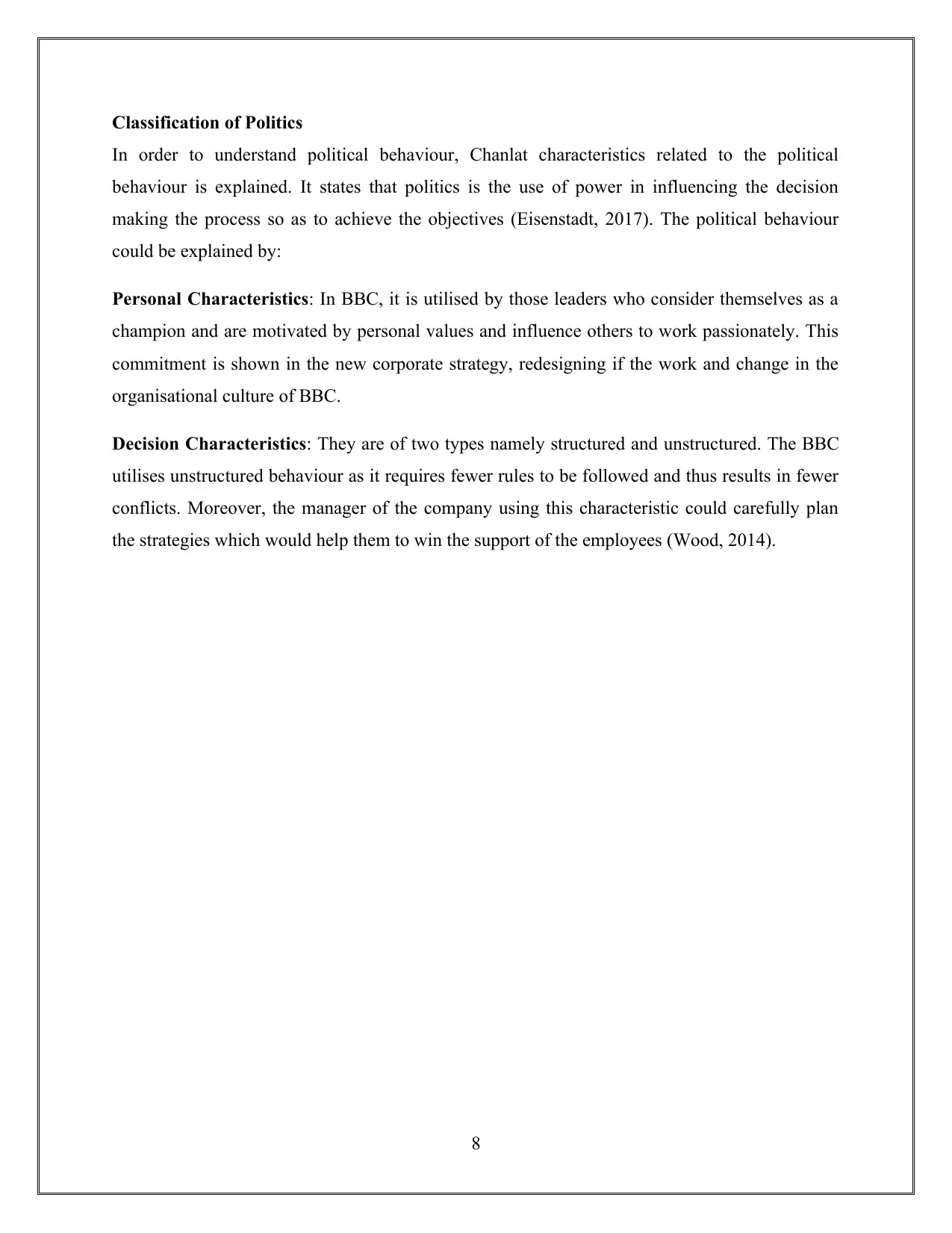
Classification of Politics
In order to understand political behaviour, Chanlat characteristics related to the political
behaviour is explained. It states that politics is the use of power in influencing the decision
making the process so as to achieve the objectives (Eisenstadt, 2017). The political behaviour
could be explained by:
Personal Characteristics: In BBC, it is utilised by those leaders who consider themselves as a
champion and are motivated by personal values and influence others to work passionately. This
commitment is shown in the new corporate strategy, redesigning if the work and change in the
organisational culture of BBC.
Decision Characteristics: They are of two types namely structured and unstructured. The BBC
utilises unstructured behaviour as it requires fewer rules to be followed and thus results in fewer
conflicts. Moreover, the manager of the company using this characteristic could carefully plan
the strategies which would help them to win the support of the employees (Wood, 2014).
8
In order to understand political behaviour, Chanlat characteristics related to the political
behaviour is explained. It states that politics is the use of power in influencing the decision
making the process so as to achieve the objectives (Eisenstadt, 2017). The political behaviour
could be explained by:
Personal Characteristics: In BBC, it is utilised by those leaders who consider themselves as a
champion and are motivated by personal values and influence others to work passionately. This
commitment is shown in the new corporate strategy, redesigning if the work and change in the
organisational culture of BBC.
Decision Characteristics: They are of two types namely structured and unstructured. The BBC
utilises unstructured behaviour as it requires fewer rules to be followed and thus results in fewer
conflicts. Moreover, the manager of the company using this characteristic could carefully plan
the strategies which would help them to win the support of the employees (Wood, 2014).
8
⊘ This is a preview!⊘
Do you want full access?
Subscribe today to unlock all pages.

Trusted by 1+ million students worldwide
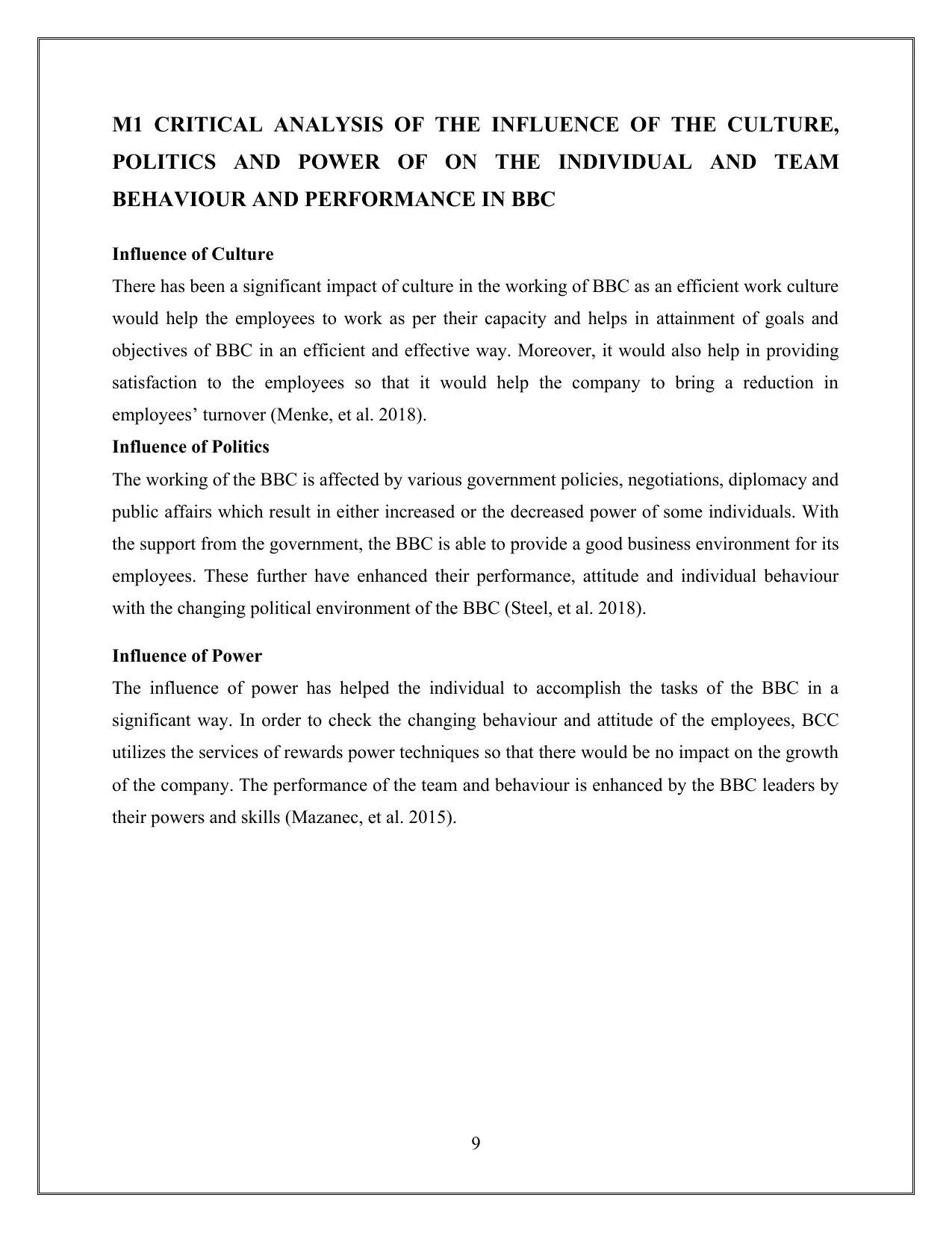
M1 CRITICAL ANALYSIS OF THE INFLUENCE OF THE CULTURE,
POLITICS AND POWER OF ON THE INDIVIDUAL AND TEAM
BEHAVIOUR AND PERFORMANCE IN BBC
Influence of Culture
There has been a significant impact of culture in the working of BBC as an efficient work culture
would help the employees to work as per their capacity and helps in attainment of goals and
objectives of BBC in an efficient and effective way. Moreover, it would also help in providing
satisfaction to the employees so that it would help the company to bring a reduction in
employees’ turnover (Menke, et al. 2018).
Influence of Politics
The working of the BBC is affected by various government policies, negotiations, diplomacy and
public affairs which result in either increased or the decreased power of some individuals. With
the support from the government, the BBC is able to provide a good business environment for its
employees. These further have enhanced their performance, attitude and individual behaviour
with the changing political environment of the BBC (Steel, et al. 2018).
Influence of Power
The influence of power has helped the individual to accomplish the tasks of the BBC in a
significant way. In order to check the changing behaviour and attitude of the employees, BCC
utilizes the services of rewards power techniques so that there would be no impact on the growth
of the company. The performance of the team and behaviour is enhanced by the BBC leaders by
their powers and skills (Mazanec, et al. 2015).
9
POLITICS AND POWER OF ON THE INDIVIDUAL AND TEAM
BEHAVIOUR AND PERFORMANCE IN BBC
Influence of Culture
There has been a significant impact of culture in the working of BBC as an efficient work culture
would help the employees to work as per their capacity and helps in attainment of goals and
objectives of BBC in an efficient and effective way. Moreover, it would also help in providing
satisfaction to the employees so that it would help the company to bring a reduction in
employees’ turnover (Menke, et al. 2018).
Influence of Politics
The working of the BBC is affected by various government policies, negotiations, diplomacy and
public affairs which result in either increased or the decreased power of some individuals. With
the support from the government, the BBC is able to provide a good business environment for its
employees. These further have enhanced their performance, attitude and individual behaviour
with the changing political environment of the BBC (Steel, et al. 2018).
Influence of Power
The influence of power has helped the individual to accomplish the tasks of the BBC in a
significant way. In order to check the changing behaviour and attitude of the employees, BCC
utilizes the services of rewards power techniques so that there would be no impact on the growth
of the company. The performance of the team and behaviour is enhanced by the BBC leaders by
their powers and skills (Mazanec, et al. 2015).
9
Paraphrase This Document
Need a fresh take? Get an instant paraphrase of this document with our AI Paraphraser
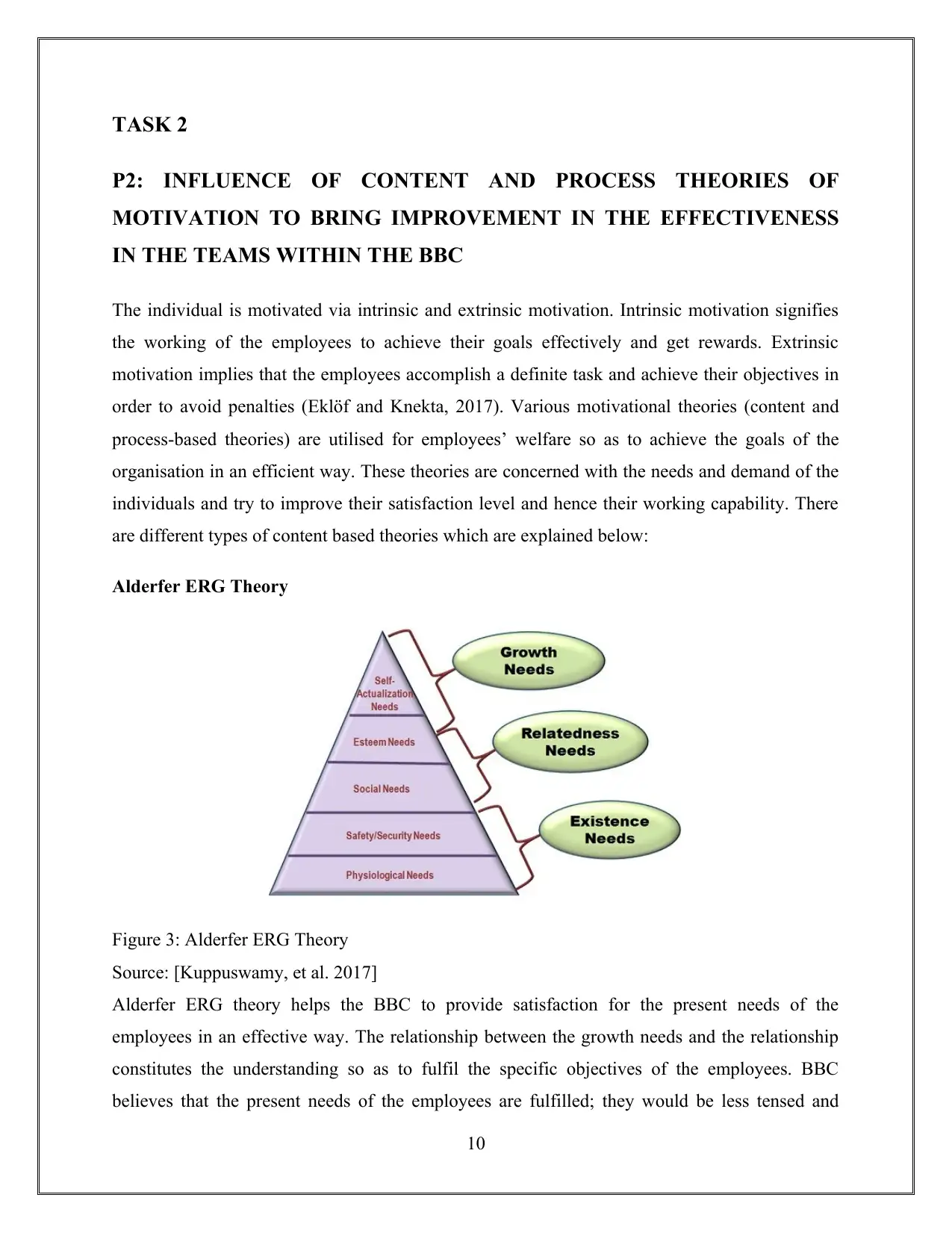
TASK 2
P2: INFLUENCE OF CONTENT AND PROCESS THEORIES OF
MOTIVATION TO BRING IMPROVEMENT IN THE EFFECTIVENESS
IN THE TEAMS WITHIN THE BBC
The individual is motivated via intrinsic and extrinsic motivation. Intrinsic motivation signifies
the working of the employees to achieve their goals effectively and get rewards. Extrinsic
motivation implies that the employees accomplish a definite task and achieve their objectives in
order to avoid penalties (Eklöf and Knekta, 2017). Various motivational theories (content and
process-based theories) are utilised for employees’ welfare so as to achieve the goals of the
organisation in an efficient way. These theories are concerned with the needs and demand of the
individuals and try to improve their satisfaction level and hence their working capability. There
are different types of content based theories which are explained below:
Alderfer ERG Theory
Figure 3: Alderfer ERG Theory
Source: [Kuppuswamy, et al. 2017]
Alderfer ERG theory helps the BBC to provide satisfaction for the present needs of the
employees in an effective way. The relationship between the growth needs and the relationship
constitutes the understanding so as to fulfil the specific objectives of the employees. BBC
believes that the present needs of the employees are fulfilled; they would be less tensed and
10
P2: INFLUENCE OF CONTENT AND PROCESS THEORIES OF
MOTIVATION TO BRING IMPROVEMENT IN THE EFFECTIVENESS
IN THE TEAMS WITHIN THE BBC
The individual is motivated via intrinsic and extrinsic motivation. Intrinsic motivation signifies
the working of the employees to achieve their goals effectively and get rewards. Extrinsic
motivation implies that the employees accomplish a definite task and achieve their objectives in
order to avoid penalties (Eklöf and Knekta, 2017). Various motivational theories (content and
process-based theories) are utilised for employees’ welfare so as to achieve the goals of the
organisation in an efficient way. These theories are concerned with the needs and demand of the
individuals and try to improve their satisfaction level and hence their working capability. There
are different types of content based theories which are explained below:
Alderfer ERG Theory
Figure 3: Alderfer ERG Theory
Source: [Kuppuswamy, et al. 2017]
Alderfer ERG theory helps the BBC to provide satisfaction for the present needs of the
employees in an effective way. The relationship between the growth needs and the relationship
constitutes the understanding so as to fulfil the specific objectives of the employees. BBC
believes that the present needs of the employees are fulfilled; they would be less tensed and
10
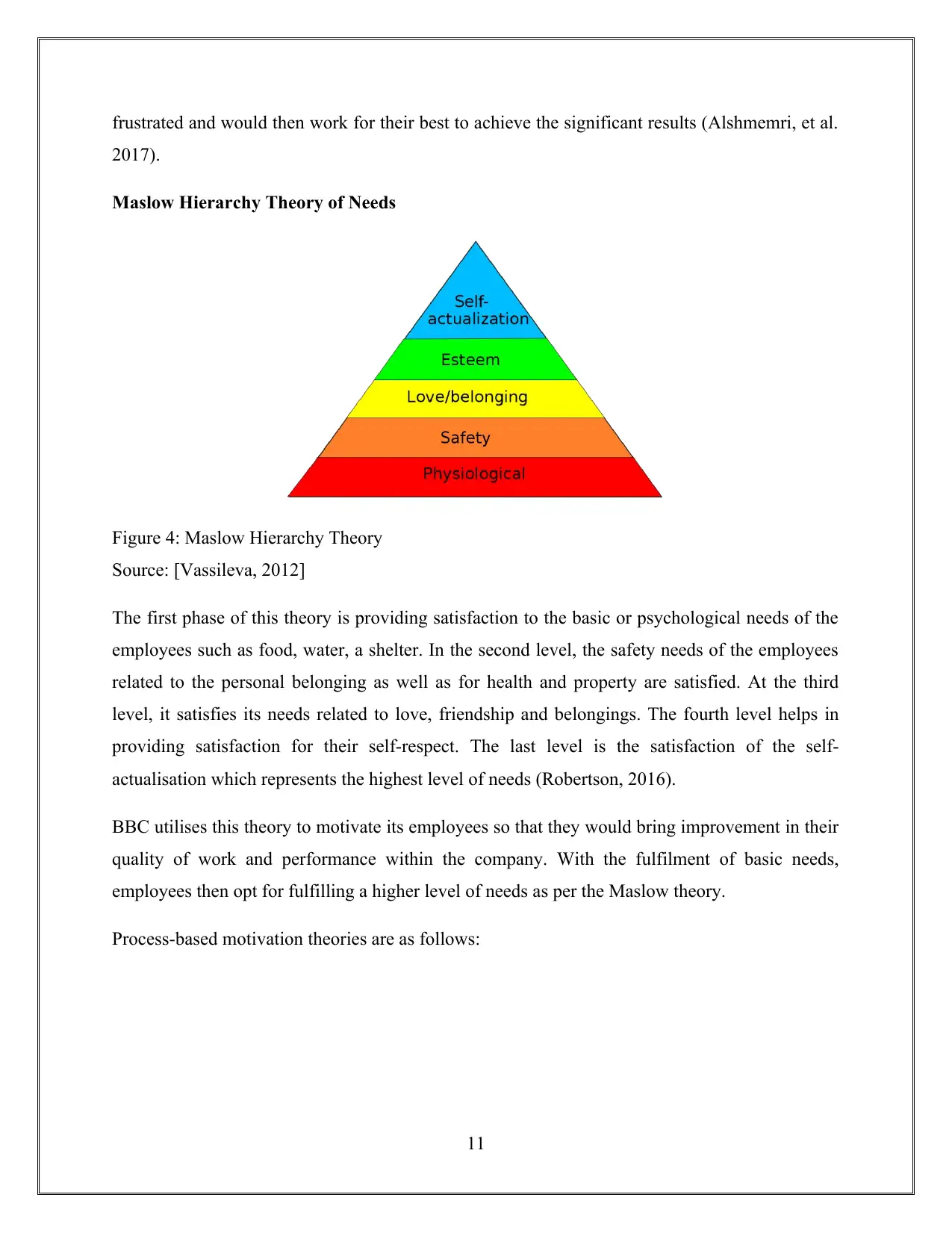
frustrated and would then work for their best to achieve the significant results (Alshmemri, et al.
2017).
Maslow Hierarchy Theory of Needs
Figure 4: Maslow Hierarchy Theory
Source: [Vassileva, 2012]
The first phase of this theory is providing satisfaction to the basic or psychological needs of the
employees such as food, water, a shelter. In the second level, the safety needs of the employees
related to the personal belonging as well as for health and property are satisfied. At the third
level, it satisfies its needs related to love, friendship and belongings. The fourth level helps in
providing satisfaction for their self-respect. The last level is the satisfaction of the self-
actualisation which represents the highest level of needs (Robertson, 2016).
BBC utilises this theory to motivate its employees so that they would bring improvement in their
quality of work and performance within the company. With the fulfilment of basic needs,
employees then opt for fulfilling a higher level of needs as per the Maslow theory.
Process-based motivation theories are as follows:
11
2017).
Maslow Hierarchy Theory of Needs
Figure 4: Maslow Hierarchy Theory
Source: [Vassileva, 2012]
The first phase of this theory is providing satisfaction to the basic or psychological needs of the
employees such as food, water, a shelter. In the second level, the safety needs of the employees
related to the personal belonging as well as for health and property are satisfied. At the third
level, it satisfies its needs related to love, friendship and belongings. The fourth level helps in
providing satisfaction for their self-respect. The last level is the satisfaction of the self-
actualisation which represents the highest level of needs (Robertson, 2016).
BBC utilises this theory to motivate its employees so that they would bring improvement in their
quality of work and performance within the company. With the fulfilment of basic needs,
employees then opt for fulfilling a higher level of needs as per the Maslow theory.
Process-based motivation theories are as follows:
11
⊘ This is a preview!⊘
Do you want full access?
Subscribe today to unlock all pages.

Trusted by 1+ million students worldwide
1 out of 29
Related Documents
Your All-in-One AI-Powered Toolkit for Academic Success.
+13062052269
info@desklib.com
Available 24*7 on WhatsApp / Email
![[object Object]](/_next/static/media/star-bottom.7253800d.svg)
Unlock your academic potential
Copyright © 2020–2026 A2Z Services. All Rights Reserved. Developed and managed by ZUCOL.





